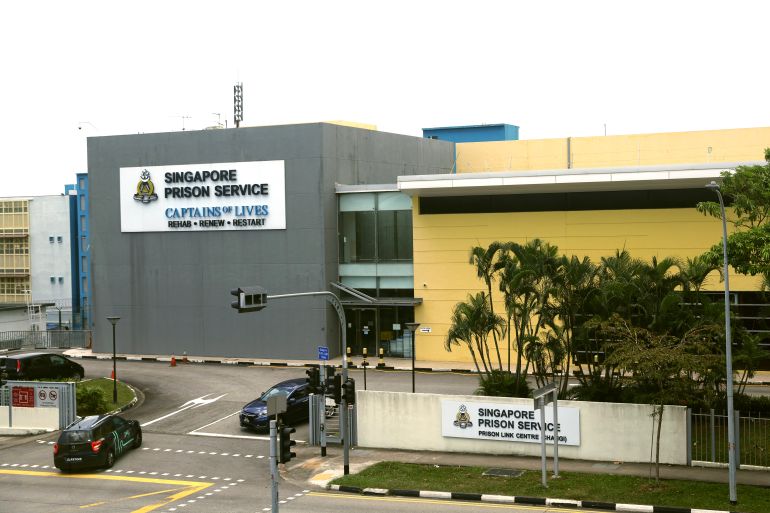Singapore hangs man for trafficking 1.5kg of cannabis
The execution is the second in three weeks and comes amid growing concern at the city state’s use of the death penalty for drug offences.

Singapore has hanged a man for trafficking cannabis, its second execution in three weeks.
The 37-year-old ethnic Malay Singaporean was executed at Changi Prison on the island’s east coast at dawn on Wednesday, after a last-minute attempt to reopen his case was rejected by the appeal court without a hearing.
Keep reading
list of 4 itemsSingapore’s death row ‘main element of its drug policy’
Recorded executions rise to highest in five years: Amnesty
Iran hangs ‘sultan of cocaine’ as UN warns of rising executions
The man, who was not named because his family asked for privacy, was convicted in 2019 of trafficking about 1.5 kilogrammes (3.3 pounds) of cannabis, said Kokila Annamalai of the Transformative Justice Collective, which campaigns for the abolition of the death penalty in Singapore.
His bid to reopen the case was based on DNA evidence and fingerprints that tied him to a much smaller amount, which he admitted to possessing, but the court rejected it, she added.
On April 26, Singapore hanged 46-year-old Tangaraju Suppiah for trafficking more than 1kg (2.2 pounds) of cannabis, despite last-minute appeals for clemency from his family and activists that had attracted international attention.
They argued that Tangaraju had not been provided with adequate legal counsel and that he was denied access to a Tamil interpreter when he was being questioned by the police.
Under Singapore law, trafficking more than 500gm (1.1 pounds) of cannabis can result in the death penalty.
“If we don’t come together to stop it, we fear that this killing spree will continue in the weeks and months to come,” Annamalai told The Associated Press news agency.
After a halt during the COVID-19 pandemic, Singapore hanged 11 people last year – all of them for drug offences.
The execution a year ago of Nagaenthran Dharmalingam, a Malaysian with learning disabilities, drew particular outrage and prompted rare protests in the city-state where demonstrations are strictly controlled.
Under international human rights law, those countries that retain the death penalty are supposed to use it only for “the most serious crimes” that involve intentional killing.
But Singapore’s Ministry of Home Affairs argues that capital punishment is “an essential component of Singapore’s criminal justice system and has been effective in keeping Singapore safe and secure”.
Authorities say that all prisoners get due process of law.
In a report in March, drug policy reform group Harm Reduction International (HRI) found that despite a worldwide shift towards abolition, there were at least 285 executions for drugs last year, more than double the number of the previous year.
“This figure is likely to reflect only a percentage of all drug-related executions worldwide,” HRI said, noting the extreme secrecy surrounding the death penalty in many countries that use it the most, including China, Vietnam and North Korea.